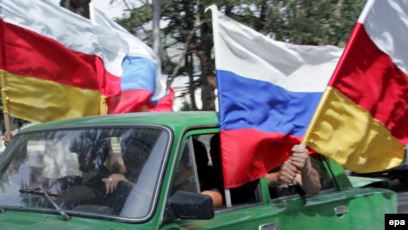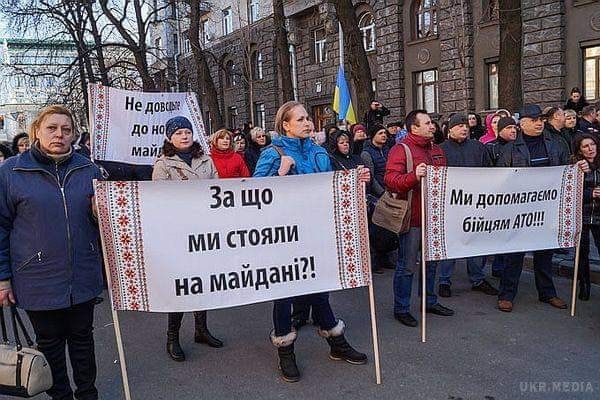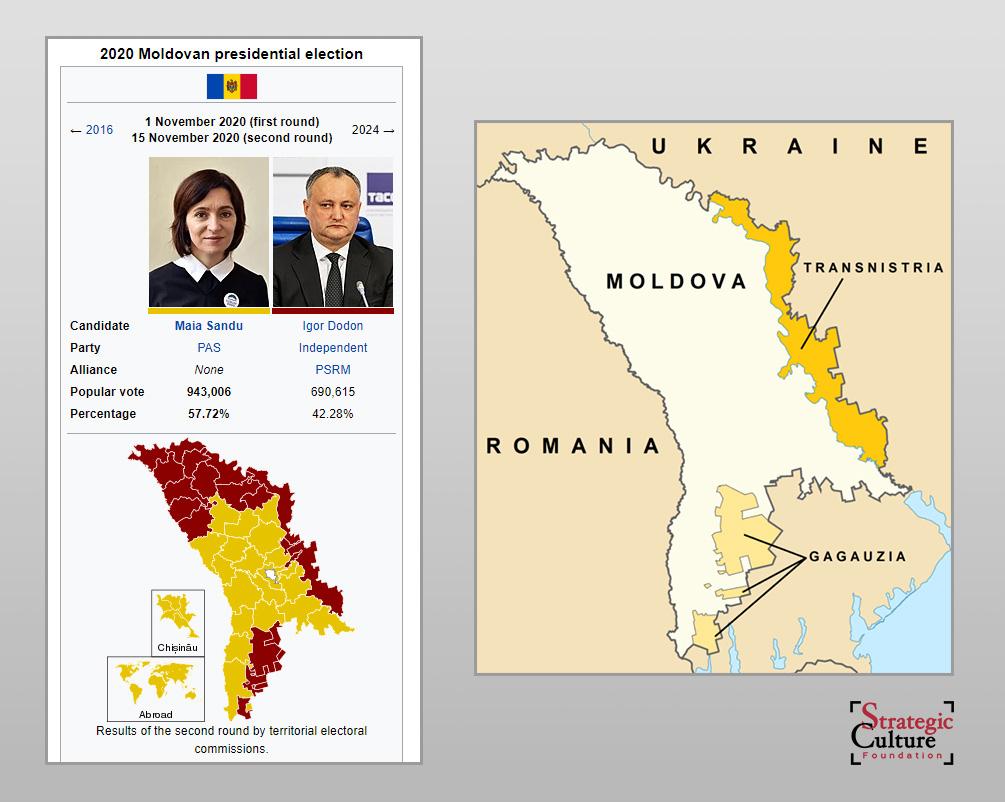Tim Kirby
After years of attack from all sides and nearly being forced out of office twice, Moldovan leader Igor Dodon lost the recent presidential election. Mr. Dodon is known as a solid pragmatic politician with a pro-Russian slant and his replacement has the exact opposite opinions about with whom Moldova should orient its future. We have seen many times over recent decades exactly what happens when a leader with sympathies for Russia gets replaced by someone at the beck and call of Washington in a Former Soviet Republic. History, as they say, "repeats itself" so the near future for Moldova will in all likelihood follow the trajectory of other nearby nations that used to be their countrymen.
The Ukrainian, Georgian, Armenian Scenario is most likely
All of these countries share certain common features/tendencies.
- All of them were part of the Soviet Union/Russian Empire for centuries with deep cultural ties to Russia.
- All of them had at least one "odd" piece territory with a highly questionable and somewhat tense status (The Crimea, Abkhazia, South Ossetia, Nagorno-Karabakh, and later the Donbass)
- All of them took radically anti-Russian shifts after a Color Revolution like scenario played out, meaning Russophobia became a core element of the justification for the rule of the revolutionary government.
Moldova meets all the criteria above with the exception that a full-fledged Color Revolution did not seem to take place. Dodon was under political assault his entire reign in office, but it was not protestors on the street with media support that booted him out of power - he simply lost the election. Perhaps there was some electoral trickery at play, especially considering Mr. Dodon enjoyed solid public popularity, but there is at this point no evidence of this and he has thus far accepted his loss gracefully.
Image: A scary powderkeg scenario is falling into place as the potential breakaway republics voted strongly for the now outgoing president.
But the places where Dodon won the most support are very telling - Gagauzia and Transdniester. These are regions that much like South Ossetia or the Donbass, are not at all happy with a pro-Western and potentially Romanian Nationalist president coming to power. They have a different ethnic makeup, no problem with speaking Russian, and do not identify with being "Moldovan", especially when Transdiester issues its own passport and has basically been a de facto independent republic for decades.
As we have seen time and time again when pro-Western paradoxically Nationalist Liberals come to power in Eastern Europe minorities suffer. The most bold example of this was Georgia's Saakashvili, who directly tried to snuff out the ethnic republics within his borders. This shows the truly incredible levels of double think in the West when Lukashenko is "the last dictator in Europe" ignoring the fact that there was a real attempt at old-school direct tank vs. civilian genocide in Georgia in 2008.
The horrors of the war in the Donbass perpetrated by confused conscripts under Nazi private battalions (surprisingly acknowledged by the Western Mainstream Media quietly) and the recent bloody mess in Nagorno-Karabakh initiated by a Color Revolution government in Yerevan show that Moldova will surely be next.
On a more day-to-day level, Moldova is sure to make exactly the same assumptions and mistakes as their neighbors economically as well. The new president and cabinet will be absolutely sure that the EU deeply values them and will make them rich. A few Moldovan politicians like Dodon are bold enough to push the point that half of their rather weak economy is food, clothing, and alcohol and it is unlikely that Moldovan wine shipped over great distances will somehow beat competitors like France. Furthermore, not only is competing in the EU for wine sales tough, but losing the main importer of their wines, Russia, is not a wise financial move. And surely Adidas and Zara are shaking in their boots at the prospect of having Moldovan competition made in small quantities by locals.
In short, the only argument that you will hear for Moldova orienting itself to the EU is Russophobia. Nothing besides that makes sense, then again Russophobia itself isn't particularly sensical most of the time.
Of course, just like around the remnants of the USSR the Russian language is sure to come under attack while LGBT parades and propaganda will become commonplace as they are both key objectives of Washington's foreign policy, as strange and sad as that may sound.
So far we have taken a look at how tendencies in Russia's old territory can and probably will affect Moldova, but why do these tendencies exist? What causes these repeat patterns of politics and what could be done to change them?
Why do Breakaway Republics inside Former Soviet Republics always side with Russia?
The short answer is because they know they will be safe, because the Russians do not care what they do and the leadership of these regions does not fall for the nationalistic rhetoric of the dominant ethnicity of the country.
People wonder why United Russia and Putin always get such strong votes from ethnic minorities inside of Russia. This is because they fear the rise of some sort of (Liberal) Nationalists who will treat them like Russians get treated across the border - linguistically, culturally, and systemically repressed and at times murdered.
The breakaway republics look at things in the same way, they see Russia as a force that will not kill off their local language or force them into a different religion. Generally Moscow doesn't care what hundreds of little ethnicities do as long as they play ball. Russia has generally assimilated while not exterminating outside cultures as it expanded and this attitude sure seems a lot more appealing when you hear tanks rumbling towards you near the beaches of Abkhazia.

Image: South Ossetians love Russia because they saved them from extermination in 2008. Wouldn't you?
Although there are Uzbek nationalists who play the same Russophobic game within Uzbekistan, the Uzbeks (and many other minorities) in Kazakhstan are very concerned with keeping Russian as "the language of interethnic communication" to not feel the squeeze from Russophobic Kazakh Nationalists. Out of pure survival instinct you can hear many a pro-Russian monologue from a terrified minority in a Former Soviet Republic. The Uzbeks outside of Uzbekistan like the Russian approach to power which may fade away with time in Kazakhstan.
And in many ways, Russia being a safety net from oppression is how so many regions joined it in the first place. One side wants to invade you, crush your religion and force you to speak a new language, while Russia wants your tax money and will ask your kids to learn Russian in school a bit. Many Former Soviet Republics actually joined Russia voluntarily because nations like Iran and Turkey were much more scary at the time.
Why are Breakaway Republics attacked by Russophobic Liberal Nationalists, doesn't that just hand them to the Russians?
One thing that the Former USSR and many other nations have in common is a centuries old tradition of feeling inferior to the West. Despite the fact that from a Western perspective Europe and America are on the decline if not collapsing, local yocals in Eastern Europe are still absolutely convinced that submission to the West will make their nation rich and powerful overnight.

Image: "What did we stand at the Maidan for?". For the sake of a cultural inferiority complex that convinced them they are "Ukranians" and not Russians with a southern accent. (Source: ukr.media)
Since those in the Warsaw Pact nations perceive themselves as inherently worse than the West they overestimate the value of attention from the EU/Washington. The little Democratic Dictators like Saakashvili and Pashinyan seriously believed that the West were their new "friends" who would support them in their military adventures. They felt emboldened by having the White God Men of Europe give them their grace and let it go to their heads. They were sure that people who cannot find their countries on maps, care very deeply for their destiny and are willing to do anything for them. The vassals think that because the lord will shake their hand that he is their new best buddy.
The power of this inferiority complex in and around the Former Soviet Union cannot be understated and it is a deep seeded part of every culture that speaks a bit of Russian, including the Russians themselves. The idea that submission to the West will breed prosperity is on poorly spelled protest signs on the streets of Moscow just as often as in Kiev during the Maidan.
If the above is true then why does Russia allow this?
Good question. Ultimately Russians themselves do not seem to understand that besides economic, cultural and historical interests, human beings often make decisions based on feelings and unknown irrational motivations floating around in our heads. When you get the chance to talk to Russian, pundits, politicians and thinkers it becomes quite clear that virtually none of them are aware of what was written above, which leads to bad decision making. False assumptions = failing results.
In a sense a lot of the political happenings in the Former Soviet Republics are all just a big popularity contest that Russia loses mostly due to not being aware that the contest is going on at all let alone preparing as best they can to win it. Russophobia is seen, acknowledged, analyzed but never countered by the same means that it is projected.
Inside pro-Russian politics the participants see themselves in a battle against the degradation of the culturally masochistic West, trying to break free from the "yolk" of the world's greatest empire (for the second time) while staring at a golden cross in the sky. But there are no movies or video games to support this vision. The most exciting ideas that could make Russia look "cool" remain hidden in academic discussions and Zoom conferences with dismal audio quality. Russia does not speak to its former territory in a way that would make it seem vastly and obviously superior to the West.
It is Russia's inability to market itself that is going to doom some of the locals in Gagauzia and Transdniester to a fresh new period of misery in the upcoming years. Russia simply cannot rely on being "the alternative to genocidal regimes" in order to get its territory back one breakaway republic at a time.
